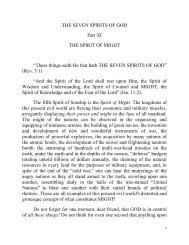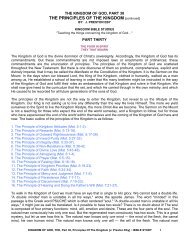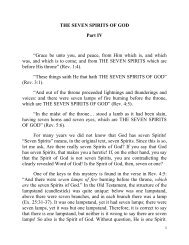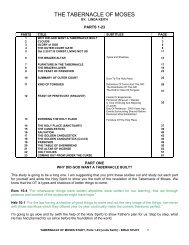Song of the Bride, Parts 1-34 - Feasting at the King's Table
Song of the Bride, Parts 1-34 - Feasting at the King's Table
Song of the Bride, Parts 1-34 - Feasting at the King's Table
You also want an ePaper? Increase the reach of your titles
YUMPU automatically turns print PDFs into web optimized ePapers that Google loves.
was so but I did not strive with him because he had not yet been called to leave <strong>the</strong> broad places to learn <strong>the</strong><br />
lessons <strong>of</strong> <strong>the</strong> wilderness.<br />
The account <strong>of</strong> Jacob demonstr<strong>at</strong>es clearly <strong>the</strong> two n<strong>at</strong>ures in <strong>the</strong> believer. The same two n<strong>at</strong>ures are in every<br />
child <strong>of</strong> God today, <strong>the</strong> spiritual and <strong>the</strong> carnal, <strong>the</strong> one, which believes God and <strong>the</strong> o<strong>the</strong>r which disbelieves. It<br />
is because <strong>of</strong> this we need to cry daily, “Lord, I believe; help Thou mine unbelief.” (I quote from Gleanings in<br />
Genesis):<br />
“When he heard th<strong>at</strong> Esau was on his way to meet him, Jacob took all th<strong>at</strong> he had over <strong>the</strong> brook Jabbok<br />
("emptying"). “And Jacob was left alone.” To be left alone with God is <strong>the</strong> only true way <strong>of</strong> arriving <strong>at</strong> a just<br />
knowledge <strong>of</strong> ourselves and our ways. We can never get a true estim<strong>at</strong>e <strong>of</strong> n<strong>at</strong>ure and all its actings until we<br />
have weighed <strong>the</strong>m in <strong>the</strong> balances <strong>of</strong> <strong>the</strong> sanctuary. No m<strong>at</strong>ter wh<strong>at</strong> we may think about ourselves, nor yet<br />
wh<strong>at</strong> man may think about us, <strong>the</strong> gre<strong>at</strong> question is: Wh<strong>at</strong> does God think about us? And <strong>the</strong> answer to this<br />
question can only be learned when we are ‘left alone.’ Away from <strong>the</strong> world, away from self, away from all <strong>the</strong><br />
thoughts, reasoning, imaginings, and emotions <strong>of</strong> mere n<strong>at</strong>ure, thus only can we get a correct judgment about<br />
ourselves.<br />
“The lessons Jacob learned are our lessons also: (1) It is n<strong>at</strong>ural to <strong>the</strong> “flesh” to plan and scheme and to<br />
desire <strong>the</strong> ordering <strong>of</strong> our lives. (2) The mind <strong>of</strong> <strong>the</strong> flesh deems itself fully competent to order our life. (3) But<br />
God, in His faithfulness and love, determines to correct this habit in His child. (4) Long does He bear with our<br />
self-confidence and self-sufficiency, but He must and will bring us to <strong>the</strong> end <strong>of</strong> ourselves. (5) To accomplish<br />
this He lays His hand on us, and makes us conscious <strong>of</strong> our utter helplessness. (6) This He does by “wi<strong>the</strong>ring”<br />
us in <strong>the</strong> se<strong>at</strong> <strong>of</strong> our n<strong>at</strong>ural strength, and by writing <strong>the</strong> sentence <strong>of</strong> de<strong>at</strong>h on our flesh. (7) As a result, we<br />
learn to cling to Him in our weakness, and seek His “blessing.” (8) Wh<strong>at</strong> a lesson is this! The “flesh” cannot be<br />
subdued, but must be “wi<strong>the</strong>red” in <strong>the</strong> very sinew <strong>of</strong> its power—“because <strong>the</strong> carnal mind is enmity against<br />
God; for it is not subject to <strong>the</strong> law <strong>of</strong> God, nei<strong>the</strong>r indeed can be.” (9) Th<strong>at</strong> which hinders us in our growth in<br />
grace is not so much our spiritual weakness as it is confidence in our n<strong>at</strong>ural strength! (10) Not until <strong>the</strong>se<br />
truths are apprehended shall we cease to be “contenders,’ and gladly take our place as clay in <strong>the</strong> hands <strong>of</strong> <strong>the</strong><br />
Potter, happy for Him to “command” and order our lives for us. (11) Then will it be with us, as with Jacob—“And<br />
He blessed him <strong>the</strong>re.”(12) And so will <strong>the</strong> sequel, too, prove true <strong>of</strong> us—“The sun rose upon him,” for “The<br />
p<strong>at</strong>h <strong>of</strong> <strong>the</strong> just shineth more and more unto <strong>the</strong> perfect day."<br />
“Wh<strong>at</strong> is <strong>the</strong> significance <strong>of</strong> Jacob’s new name? “Thy name shall be called no more Jacob, but Israel; for as a<br />
prince hast thou power with God and with men, and hast prevailed.” Gen. 32:28. “As a prince” –as a deposer,<br />
order, ruler—words used not to dignify but to reproach. “Hast thou power” – hast contended (rebellion, revolt).<br />
Jacob had contended with Esau in <strong>the</strong> womb and thus got his name “Jacob.” And long had Jacob, “<strong>the</strong> orderer”<br />
<strong>of</strong> his life contended “with God and with men.” “And hast prevailed” or succeeded. He had contended for <strong>the</strong><br />
birthright and had succeeded. He had contended for <strong>the</strong> blessing and succeeded. He had contended with<br />
Laban and succeeded. He had contended with ‘men’ and succeeded. Now he contended with God (<strong>the</strong><br />
Wrestler) and fails. Hence his new name was changed to Israel, God commands, to teach him <strong>the</strong> gre<strong>at</strong>ly<br />
needed lesson <strong>of</strong> dependence upon God. Jacob had arranged everything for appeasing his bro<strong>the</strong>r Esau.<br />
Now, God is going to take him in hand and order all things for him.” (Unquote)<br />
To learn this lesson, and to take this low place before God, Jacob must be humbled. He must be lamed as to<br />
his own strength, and made to limp. Jacob’s new name was to be a constant reminder to him th<strong>at</strong> he had<br />
learned th<strong>at</strong> it was not he who was to order and arrange his affairs, but God; and his new name, Israel,<br />
henceforth to be, him th<strong>at</strong> “God commandeth.” As Jacob he had prevailed, but now as Israel, God would<br />
command and prevail.<br />
These are <strong>the</strong> lessons th<strong>at</strong> we learn when we pass from <strong>the</strong> broad places and leave <strong>the</strong> w<strong>at</strong>chmen behind and<br />
follow our Lord into <strong>the</strong> wilderness to permit Him to do wh<strong>at</strong> needs to be done in our lives-—to teach us how to<br />
let Him command and prevail!<br />
SONG OF THE BRIDE, <strong>Parts</strong> 1–<strong>34</strong> [Elaine Cook] ~ BIBLE STUDY 20


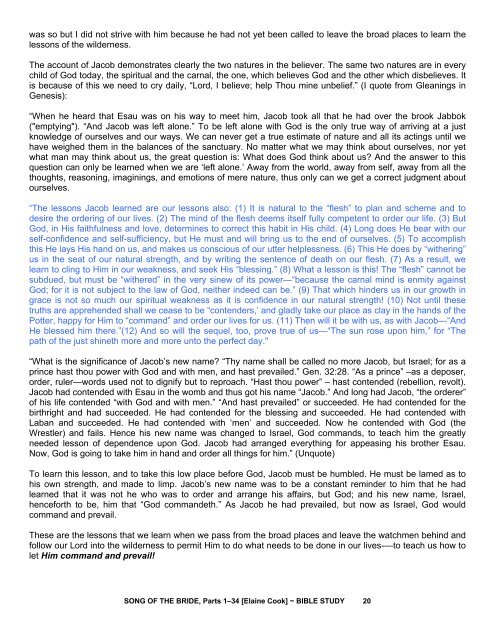
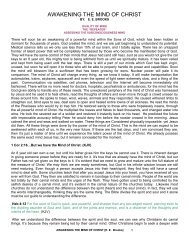
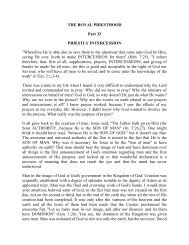
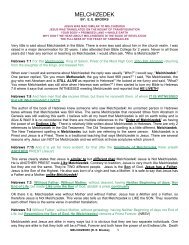
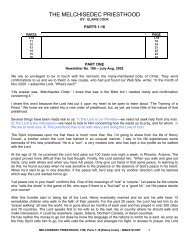
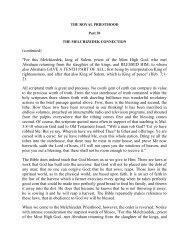
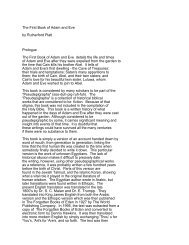
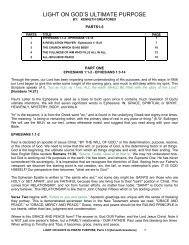
![WOOD AND STONE â THE STORY OF KING CAIN [EE Brooks]](https://img.yumpu.com/31019666/1/190x245/wood-and-stone-a-the-story-of-king-cain-ee-brooks.jpg?quality=85)
